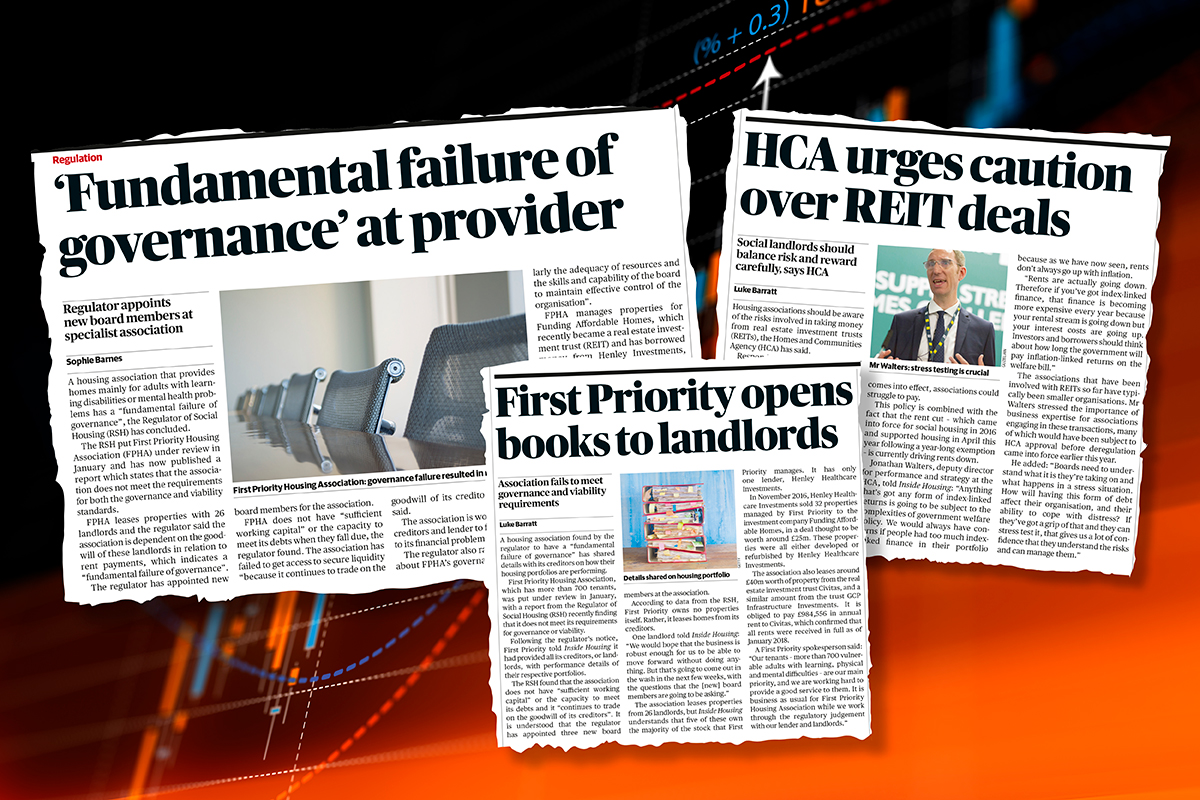You are viewing 1 of your 1 free articles
Association which came close to insolvency signed ‘uneconomic’ deals with private investors
A housing association which almost went bust earlier this year had signed up to “uneconomic” deals with a range of private equity investors and hedge funds, an Inside Housing investigation shows.
First Priority, which was declared non-compliant by the Regulator of Social Housing in February is one of a new clutch of housing associations which don’t own homes but instead ‘lease’ them from private funds and make rental payments in return.
After growing swiftly and striking deals with a range of funds, it found itself unable to pay its rents in February and was said by the regulator to “continue to trade only on the goodwill of its creditors”.
Following this, the regulator launched a wide-ranging investigation into housing associations of this type, seeking assurances over conflict of interest and placing a further four on its ‘watchlist’ for downgrades.
Speaking to Inside Housing, Jonathan Walters, deputy director of strategy and performance at the regulator, said the organisation had been signing “uneconomic” deals.
“Fundamentally, what undid the business was that some of the leases were probably ultimately uneconomic,” he said. "If you haven’t got the right policies and procedures, you might end up signing poor leases that aren’t economic for you.”
John Higgins, the current chief executive of First Priority, said that the board had realised in January of this year that under some of these deals, the association would have been unable to make the payments owed to the funds, even if it collected its rents in full.
Click here to read our full investigation into First Priority
A large percentage of its homes are understood to have been empty, or void, meaning it was not collecting rent. Mr Walters said this was a crucial factor in its near failure.
“You simply cannot manage a cashflow-based lease business with 35% void rate. When we talked about ‘a fundamental failure of governance’, that’s what we were talking about,” he said.
First Priority avoided insolvency only by agreeing a voluntary deal with its creditors in July, with the regulator’s assistance.
Inside Housing’s investigation also revealed the organisation was effectively created by Omar al-Hasso – who was at the time employed by Henley Healthcare Investments (HHI), which profited from the association’s deals and loaned it money.
Although First Priority was founded in 2011, it did not take on any homes immediately, falling dormant soon after, according to documents submitted to Companies House.
This changed when Mr Al-Hasso, who founded HHI in 2012, joined First Priority’s board a year later. The association’s accounts for September 2013 to February 2015 show that it began trading at around the same time.
HHI’s role was to source and purchase homes, lease them to housing associations and then sell the leases to funds – collecting a fee. It also loaned money directly to the organisation.
Andy Brandon, the current managing director of HHI, told Inside Housing: “I’m pretty sure that even before he came to Henley, Omar had created First Priority with this idea in mind that the long-lease model might exist.
“Although with retrospect, you can look back and say ‘conflict of interest’, another way of looking at it – probably the right way of looking at it – is that this is how you need to make it work.
“Because you’re not likely to get to any completely third-party housing association and say, ‘Do this model’. We had to create something, and I think Omar was instrumental in creating the model in the first place.”
Mr Brandon added that Mr Al-Hasso left the board “very quickly” after HHI started trading with the housing association.
According to another investor, he retained ‘observer status’, meaning he could not vote but still attended meetings and discussed decisions.
Mr Higgins told Inside Housing: “Where the leases involved Henley, Mr Al-Hasso was not involved in the decision-making to avoid a conflict of interest.”
Click here to read our in-depth investigation into First Priority











